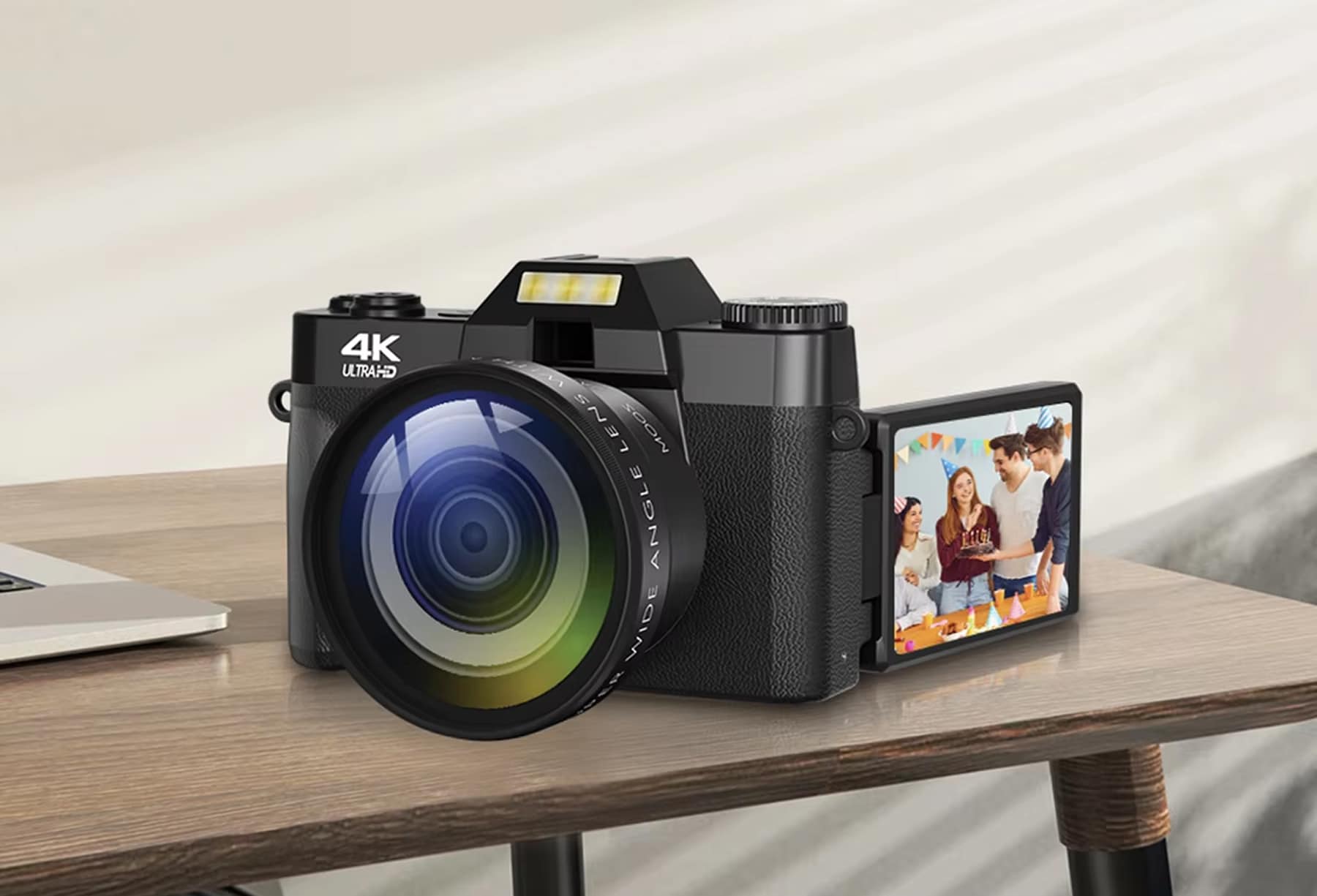

Picture this: You're on vacation in Bali, standing at the edge of a breathtaking sunset, ready to capture a once-in-a-lifetime moment. You pull out your smartphone, but the photos come out grainy and washed out. 😩 The colors are dull, the details are lost, and your perfect memory is ruined by subpar equipment. I've been there - struggling with inadequate cameras that couldn't keep up with my growing passion for photography.
That's when I discovered the transformative power of a proper beginner DSLR camera. Unlike smartphones, these cameras give you manual control, superior image quality, and room to grow as a photographer. The difference is night and day - suddenly, your photos have professional-looking bokeh, crisp details, and vibrant colors that pop.
But choosing your first DSLR can be overwhelming. With so many options on the market, how do you know which one offers the best value? Some models skimp on essential features, while others overwhelm beginners with complex controls. I've seen too many aspiring photographers waste money on cameras that either frustrate them or don't meet their needs.
After testing dozens of models, I've identified the best 5 DSLR cameras for beginners in 2025 that strike the perfect balance between ease-of-use and professional results. These cameras won't break the bank but will give you room to grow your skills. Whether you're into travel photography, vlogging, or just capturing family moments, there's an option here for you.
In this guide, I'll share my hands-on experience with each camera, highlighting their strengths and weaknesses. You'll learn what features actually matter for beginners and which ones you can safely ignore. By the end, you'll know exactly which DSLR will help you capture stunning photos without the steep learning curve. 🔍 Let's dive into the evaluation criteria before exploring our top picks!
Image Quality
Evaluates sensor resolution, low-light performance, and color accuracy for crisp, professional-looking photos.
Ease of Use
Assesses beginner-friendly features like guided modes, intuitive controls, and helpful tutorials.
Versatility
Measures the camera's adaptability for different photography styles and growth potential.
Value for Money
Compares features against price to determine the best budget-friendly options for beginners.
The Lensiox DSLR Camera For Beginners is a standout choice for vloggers and photography enthusiasts. Its 56MP CMOS sensor delivers stunning image quality, while the 4K video recording ensures smooth, high-resolution footage. The 3" flip screen is perfect for selfies and vlogging, making it a versatile tool for content creators. 🎥
This camera shines with its 16X digital zoom and autofocus capabilities, allowing users to capture distant subjects with clarity. The included wide-angle and macro lens add creative flexibility, ideal for landscapes and close-ups. The WiFi function enables easy photo transfers and live streaming, a game-changer for social media enthusiasts. 📱
With features like time-lapse, slow motion, and looping recording, the Lensiox camera offers professional-grade functionality at an affordable price. The built-in fill light ensures good performance in low-light conditions, while the 180° rotatable screen simplifies framing shots from any angle. 🎬
The included 32GB memory card and dual batteries provide ample storage and extended shooting sessions. The camera's compact design makes it portable, yet it doesn't compromise on features. Its HDMI output and webcam function further enhance its usability for various scenarios. 🖥️
Overall, the Lensiox DSLR Camera is a top-tier option for beginners and casual photographers. Its combination of high-resolution imaging, advanced features, and user-friendly design makes it a must-have for anyone serious about photography or vlogging. 🌟
The Canon EOS Rebel T7 stands out as an excellent entry-level DSLR, offering a perfect balance of simplicity and performance. Its 24.1MP CMOS sensor delivers crisp, detailed images, while the DIGIC 4+ processor ensures smooth operation.
Beginners will appreciate the intuitive interface and guided modes that make learning photography effortless. The camera's lightweight design and comfortable grip make it ideal for extended shooting sessions.
With built-in Wi-Fi and NFC, the Rebel T7 simplifies photo sharing and remote control via smartphone. The optical viewfinder provides a traditional shooting experience, while the 3-inch LCD offers live view composition.
The 18-55mm kit lens covers versatile focal lengths for everyday photography. While the 9-point AF system is basic, it performs adequately for casual shooting scenarios.
Overall, the Rebel T7 represents exceptional value for beginners seeking quality images without complexity. Its reliable performance and Canon's ecosystem make it a smart long-term investment.
The Panasonic LUMIX redefines versatility with its unmatched 60x optical zoom range, making it ideal for travelers and wildlife enthusiasts. Its 18.1MP sensor captures detailed images across the impressive focal range.
This bridge camera features 4K video recording and unique 4K Photo modes, allowing users to extract high-quality stills from video footage. The Post Focus function provides creative flexibility by letting you adjust focus after capture.
The POWER O.I.S. stabilization system effectively compensates for handshake, especially valuable at maximum zoom. The 2,360K-dot electronic viewfinder offers clear composition even in bright sunlight.
While not a true DSLR, the Panasonic's DSLR-like handling and manual controls provide a similar experience. The fixed lens covers an incredible 20-1200mm equivalent range, eliminating the need for multiple lenses.
For beginners wanting all-in-one convenience, the Panasonic delivers exceptional versatility. Its learning curve is slightly steeper than basic DSLRs but rewards with professional-level features.
The Nikon D3500 continues Nikon's tradition of creating user-friendly DSLRs that deliver professional-quality results. Its 24.2MP APS-C sensor produces images with excellent dynamic range and color accuracy.
Nikon's Guide Mode provides interactive tutorials within the camera, making it exceptionally beginner-friendly. The compact, lightweight body (415g) makes it ideal for travel and everyday photography.
With outstanding battery life (1550 shots), the D3500 outperforms many competitors. The SnapBridge app enables seamless wireless photo transfer, though the Bluetooth connection can be inconsistent.
The camera's 11-point autofocus system performs well in good light but struggles in low-light conditions. The 1080p video capability is decent but lacks advanced features like 4K or external microphone input.
For beginners prioritizing image quality and simplicity, the D3500 remains a top choice. Its ergonomic design and intuitive controls help new photographers develop their skills without frustration.
The Canon EOS 2000D offers an affordable entry point into DSLR photography with respectable 24.1MP image quality. Its familiar Canon interface makes it accessible to complete beginners.
While sharing the same sensor as the Rebel T7, the 2000D features simplified controls and a more basic feature set. The DIGIC 4+ processor delivers adequate performance for casual shooting.
The camera includes Wi-Fi with NFC for easy photo sharing, though the connection process isn't as seamless as newer models. The 9-point autofocus system performs adequately in good light.
Video capabilities are limited to 1080p Full HD without advanced features like microphone input or clean HDMI output. The plastic construction feels less premium than some competitors.
As Canon's most budget-friendly DSLR, the 2000D serves well for casual photographers. However, spending slightly more for the Rebel T7 or Nikon D3500 provides better long-term value.
A DSLR camera (Digital Single-Lens Reflex) is a powerful tool for beginners stepping into professional photography. These cameras use a mirror mechanism to reflect light from the lens into an optical viewfinder, allowing precise composition. Unlike point-and-shoot cameras, DSLRs offer interchangeable lenses, giving users creative control over their shots.
Designed for versatility, DSLRs excel in low-light conditions and fast-action scenarios due to their large sensors and rapid autofocus systems. They produce higher-quality images with better detail and color accuracy compared to smartphones or compact cameras. Many models also include manual controls, enabling users to adjust settings like aperture, shutter speed, and ISO.
For beginners, modern DSLRs often feature guided modes and automatic settings to ease the learning curve. These cameras are ideal for hobbyists or aspiring photographers who want room to grow their skills while capturing stunning photos.


PrimeReviewPro offers insightful reviews based on rigorous testing and real user feedback. We’re committed to helping you find the best products to meet your needs and enhance your life.